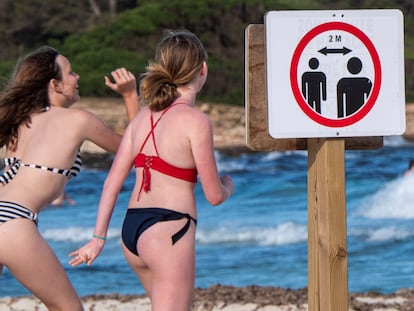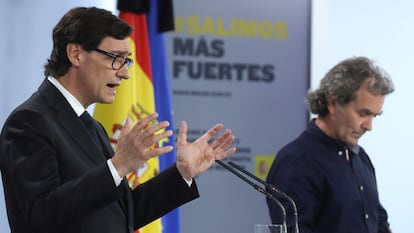Spain edges closer to ‘new normality’ with final coronavirus phase change
Most parts of the country will enter the final stage of the deescalation process on Monday, which will end on June 21 when the state of alarm expires

Spain’s regions will on Monday undergo their last phase change as part of the ongoing deescalation from a coronavirus lockdown that began in mid-March. On June 15, most parts of Spain will enter Phase 3, the last stage before the end of the state of alarm that underpins the confinement measures.
The northwestern region of Galicia is moving faster and will on Monday transition straight into what is being called “the new normality” by the Spanish government. This will restore freedom of movement but maintain certain safety norms in place, such as social distancing and heightened hygiene measures.
But territories such as Madrid and Catalonia, which have been the epicenters of the Covid-19 pandemic in Spain, are scaling down slower. On Monday seven areas will remain in Phase 2: the Madrid region; the city of Barcelona and its metropolitan area, as well the healthcare area of Lleida in Catalonia; and the provinces of Salamanca, Ávila, Segovia and Soria in the region of Castilla y León. These areas collectively represent a fourth of the Spanish population.
Meanwhile the Valencia region, the other provinces of Castilla y León, the rest of Catalonia, the provinces of Cuenca, Toledo and Ciudad Real in Castilla-La Mancha, and the exclave city of Ceuta on the northern coast of Africa will move up from Phase 2 to Phase 3. These areas are home to a collective 10 million people.
The main health-related difference between these two phases lies in the number of people who may gather in groups, and the maximum capacity allowed at public venues. But there is another dissimilarity that extends into the political sphere: under Phase 3, all decision-making powers are devolved to regional authorities, who may decide when to lift the state of alarm and enter the new normality. This is what Galicia is doing on Monday.
Spanish Health Ministry officials said they are satisfied with the way Covid-19 figures have been evolving lately. “Every day we are acquiring greater capacity for early detection of suspicious cases,” said Fernando Simón, head of the Coordination Center for Health Alerts and Emergencies. “We are detecting 55,000 suspicious cases a week, and between 90% and 93% of them are undergoing PCR testing, a rate that keeps rising. All of this allows us to think that the situation is really under control and that we can allow the phase changes.”
On June 21 at midnight, the last extension to the congressionally approved state of alarm will expire, and Spain will enter “the new normality” as described by the coalition government of the Socialist Party (PSOE) and the leftist Unidas Podemos. This normality will reflect the guidelines set out by a recent government decree and by additional norms to be established by the regions.

For instance, face masks will remain compulsory in closed spaces or when it is not possible to keep a distance of 1.5 meters between people. But citizens will be able to move freely across the Spanish territory, which is currently still not possible without justification. And in the event of future outbreaks, only the affected areas may be placed under lockdown.
In Phase 3 there are no more time slots for outdoor activities, commercial premises may open at 50% capacity (75% for restaurants’ sidewalk tables), and shopping malls can open at 40% capacity. Movie theaters, auditoriums and theaters can operate as long as they only fill 50% of seats.
Regions in Phase 2 must now decide whether to adopt Phase 3 restrictions after June 21, or whether to move straight into the new normality. In Madrid, regional premier Isabel Díaz Ayuso has not applied for Phase 3 status yet, although on Friday she said that this request will be made in a week’s time. By then, the decision will no longer be up to central health officials. But Fernando Simón said that the ministry will keep providing regions with any support they might need: “If we can discuss and assess the conditions [of Madrid], that will be beneficial for everyone.”
English version by Susana Urra.
Tu suscripción se está usando en otro dispositivo
¿Quieres añadir otro usuario a tu suscripción?
Si continúas leyendo en este dispositivo, no se podrá leer en el otro.
FlechaTu suscripción se está usando en otro dispositivo y solo puedes acceder a EL PAÍS desde un dispositivo a la vez.
Si quieres compartir tu cuenta, cambia tu suscripción a la modalidad Premium, así podrás añadir otro usuario. Cada uno accederá con su propia cuenta de email, lo que os permitirá personalizar vuestra experiencia en EL PAÍS.
¿Tienes una suscripción de empresa? Accede aquí para contratar más cuentas.
En el caso de no saber quién está usando tu cuenta, te recomendamos cambiar tu contraseña aquí.
Si decides continuar compartiendo tu cuenta, este mensaje se mostrará en tu dispositivo y en el de la otra persona que está usando tu cuenta de forma indefinida, afectando a tu experiencia de lectura. Puedes consultar aquí los términos y condiciones de la suscripción digital.








































